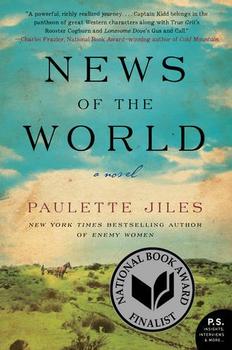Page 1 of 4
There are currently 25 member reviews
for News of the World
-
Kelli R. (Birmingham, AL)
Quiet and Powerful
After finishing News of the World yesterday, I was thrilled to learn that it made the longlist for this year's National Book Award for Fiction. What a justified honor! Captain Kidd and Johanna will linger for some time in my recollections. As the unlikely duo arrived at their destination, I felt real heartache for the futures of the old retired Army Captain and the orphan/former captive. All that emotion in only 200 or so pages! As any good historical novel should do, it also piqued my interest in Texas history following the Civil War and the phenomena of children captured and adopted by Native American tribes. I plan to pass this book along to my mother who currently lives in the Texas Hill Country which plays a prominent role in the story albeit quite unrecognizable but strangely familiar to today's Texas Hill Country. I highly recommend this novel and look forward to exploring more by Paulette Jiles.
-
Linda
A Journey of Trust
In “News of the World,” Paulette Jiles, author of “Enemy Women,” has written a story of courage, compassion, and dedication.
In the sparsely-populated Texas plains, news is hard to come by, so Captain Jefferson Kyle Kidd, an elderly widow who has fought in two wars, travels from town to town reading from newspapers to audiences interested in what is happening in the world such as the Irish immigration, erupting volcanoes, and the westward progress of the railroad.
He is happy with his solitary life. Then, in Wichita Falls, he is offered a $50 gold piece to deliver an orphaned 10-year old girl, Johanna, to her relatives in San Antonio. Joanna was taken four years earlier by the Kiowas who murdered her parents and sister. Rescued by the U.S. Army, Johanna has little memory of her life before her capture, and has completely assimilated the Kiowa life.
Kidd and Johanna set out on the hazardous 400-mile journey, not understanding each others language. Feeling that she has lost the only family she ever knew, Johanna attempts to escape several times, throws away her shoes, eats with her hands, and even steals a chicken from a friendly soul who gives them a place to camp for the night.
At each town along the way, when they stop for the night, Kidd finds someone to watch Johanna while he gives a reading to the interested townspeople. He still needs the dime-a-head admission, and readers will find out later in the book just how handy those dimes turn out to be.
As they travel, they begin to understand each others language, and Kidd tries to teach her table manners and the proper way to eat. Johanna starts calling him “Kep-dun,” then, one day, she calls him “Kontah,” the Kiowa word for “grandfather.”
“The Captain never did understand what had caused such a total change in a little girl from a German household and adopted into a Kiowa one. In a mere four years, she completely forgot her alphabet. She forgot how to use a knife and a fork and how to sing in European scales. And once she was returned to her own people, nothing came back,” Jiles writes.
They forge a bond on their journey as they face Comanche raids, bandits, and bad weather, while Kidd tries to prepare her for her German aunt and uncle.
The closer they draw to San Antonio, the more Kidd worries. Johanna was yanked from one family, then from her second one that she recognized as her true family. Now, becoming familiar with Kidd, she is about to undergo a third separation for, once again, an entirely different existence.
Jiles writes "She felt the arrival of something chilling, something wrong. Something lonely. He was the only person she had left in the world and the only human being she now knew. He was strong and wise and they had fought together at the springs. She ate with a fork now and wore the horrible dresses without complaint. What had she done wrong?"
Jiles captures the feel of the Texas landscape, from the plains of north Texas to the Hill Country to the desert of San Antonio. Moreover, she writes a beautiful story of courage, acceptance, and love.
-
Mary P. (Bellingham, WA)
News of the World
I like this novel a lot. It's the story a 400-mile journey through a lawless Texas in the 1870s, by horseback, a well-used wagon, and on foot. Retired Army Captain Jefferson Kyle Kidd, who is 70 years old and feeling his age, is offered a $50 gold piece to take a 10-year-old orphan who was abducted by Kiowa Indians when she was 6, after seeing her mother and sister killed, to relatives in San Antonio. She is member of the tribe, but the Kiowas no longer want her. It's reasonable for Kidd to take Johanna with him as he earns his keep by reading entertaining newspapers in various towns. Similarly, Paulette tells the story, not as a narrator, but as a reporter, with details of the terrain; the towns; the people, many of whom hate Indians; of Kidd's efforts to try to reteach Johanna some of the culture she is supposed to reenter.
One of the most enjoyable facets of Jiles' writing is in its cinematic quality. This is a Western, albeit unconventional. What is it like to have to immerse yourself in a culture completely alien to what you are used to? A bond grows between two people who are unlikely to care for each other; how does that happen? I didn't want to see the novel end, the story of Judd and Johanna cries for more. I highly recommend this book, and will seek out other works by Paulette Jiles.
-
Marianne D. (Crofton, MD)
Read it as soon as you can!
I just loved this book. Paulette Jiles certainly brings the characters and their surroundings to life. I knew nothing about circuit riders after the Civil War who delivered readings of exotic news to eager audiences on the frontier. This is how Captain Kidd makes his living. He is a man of his word with a big heart, and when he promises to deliver a 10 year-old German American girl to her relatives for a price, he and his charge make their way to the San Antonio area where those relatives live.
In the late 1800s on the Texas frontier, the Kiowa and other Indian tribes kidnapped children for shocking purposes. What life is like for those captured unfolds slowly but vividly in Jiles's narrative. This is a touching story filled with both humor and raw descriptions of Texas life. Every scene is described so clearly that the reader becomes part of the narrative.
I highly recommend that you put this little gem on your reading list now!
-
Pamela F. (Sun City West, AZ)
Loved this!
This book is a movie that should be made. I have already cast the characters in my mind. I will be sending this as gifts to my friends. I love historical fiction and this period in time is a great one. The relationship between the Captain & Johanna is a wonderful one. What a gem!
-
Audrey M. (Overland Park, KS)
News of the World
I thoroughly enjoyed the book. I was caught up in the relationship between Johanna and the Captain. The book brought the era and location to life. I plan to recommend it to others.
-
Tilli F. (Holyoke, MA)
News is Still Good
This is a delightful book. That may seem a strange adjective to use about Texas after the Civil War. But the author manages to mix tales about the region and time to bring it to life, and to portray he characters, particularly Johanna, so that they walk off the pages.
And periodically she uses language that makes the reader sit up and take notice. Two that struck this reader are "a shy and obsequious road that dodged every bank and lift and wound through the pecan trees and never insisted on its own way" and "He looked as if he had combed his stiff yellow hair with a skillet."
It was a period that this reader knew nothing about, and a social habit about how people in small towns in rural Texas got the news. Fun to read and informative.




